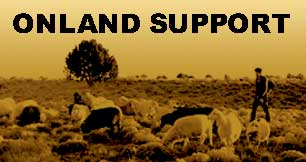What now? Hatááli leader looks to future beyond coal
December 29, 2005 by pathfinder
Filed under Archives
By Jason Begay Navajo Times 12.29.05
LUKACHUKAI, Ariz. – The coalmines on the Navajo Nation should have never
been opened. Instead, the Navajo people could have implemented other, more
original types of economic development not so dependent on foreign businesses.
This is how the head of the Navajo medicine men’s association sees it.
“They will have a real negative impact on the earth system,” said Anthony
Lee Sr., president of the 300-member Diné Hatááli Association, which
represents the reservation’s traditional medicine practitioners. “From a
medicine man’s perspective, we have to ask, why did it open in the first place?”
Now that the tribe is coming face to face with the idling of the Black Mesa
Mine and the approaching permanent closure of the McKinley Mine, Lee is
contemplating the effect such changes will have on the Navajo Nation.
In fact, the closure of the mines is simply the most recent political event
that directly affects Navajo culture. In November, Lee expressed his
opposition to the proposed expansion of Arizona Snowbowl, a ski area located on the
San Francisco Peaks.
Although Lee said he believes the Navajo Nation should not have welcomed a
strip mining operation that takes natural elements out of the ground and away
from the Navajo Nation, he chalks up the decision to politics.
“When it comes to politics, the decisions are not always in the best
interest of the land, or the people,” Lee said.
Traditional Navajo healing songs stress the relationship between humans and
the earth, commonly referred to as “mother,” Lee said. “And yet, we allow
coal to be extracted from the earth and the water to be used in the slurry line
to transport the coal.”
Lee, who teaches Navajo culture and language at Diné College, said the tribe
could have found alternative sources of income and business by looking for
other types of projects.
Specifically, Lee said as the Navajo Nation has increasingly embraced
mainstream ideals and ideologies, the people have neglected traditional Navajo
beliefs that could have helped steer the tribe toward more environmentally safe
and economically prosperous opportunities.
“We should have been on our toes. If we had followed the traditional
practices we wouldn’t be in the situation we are in today,” Lee said. “There
is a lot of intelligence found in the earth system that we haven’t even tapped into
yet. We’re using the ideology of corporate America and that’s what’s
hurting us today.”
For instance, Lee said he didn’t know if a ceremony was performed at the
sites prior to mining. It’s customary to perform a prayer and an offering to the
land before planting and again before harvesting, Lee said.
But what about when the land has been profoundly disturbed, as happens
during surface mining?
Lee said he isn’t sure if there is such a ceremony, but said the hatáálii
will look into a prayer that can be done to help heal the land once the mines
close.
“I don’t know if it’s possible to make amends with the earth,” Lee said. “
There are so many scars.”
Lee said the Navajo tribe must find a way to make mainstream American
influences benefit traditional Navajo practices, such as embracing more media
outlets like Navajo specific television and radio channels, and Navajo-specific
curriculum in schools.
A balanced system could result in keeping more of the younger generation on
the reservation and bring more ideas for future development to the table.
Until then, the Navajo Nation will not tap into its true potential, he said.
“We are a sleeping giant,” Lee said. “We’re sound asleep with our arms
crossed. We are waving a flag like everything is well, but it isn’t. We need to
wake up.”


